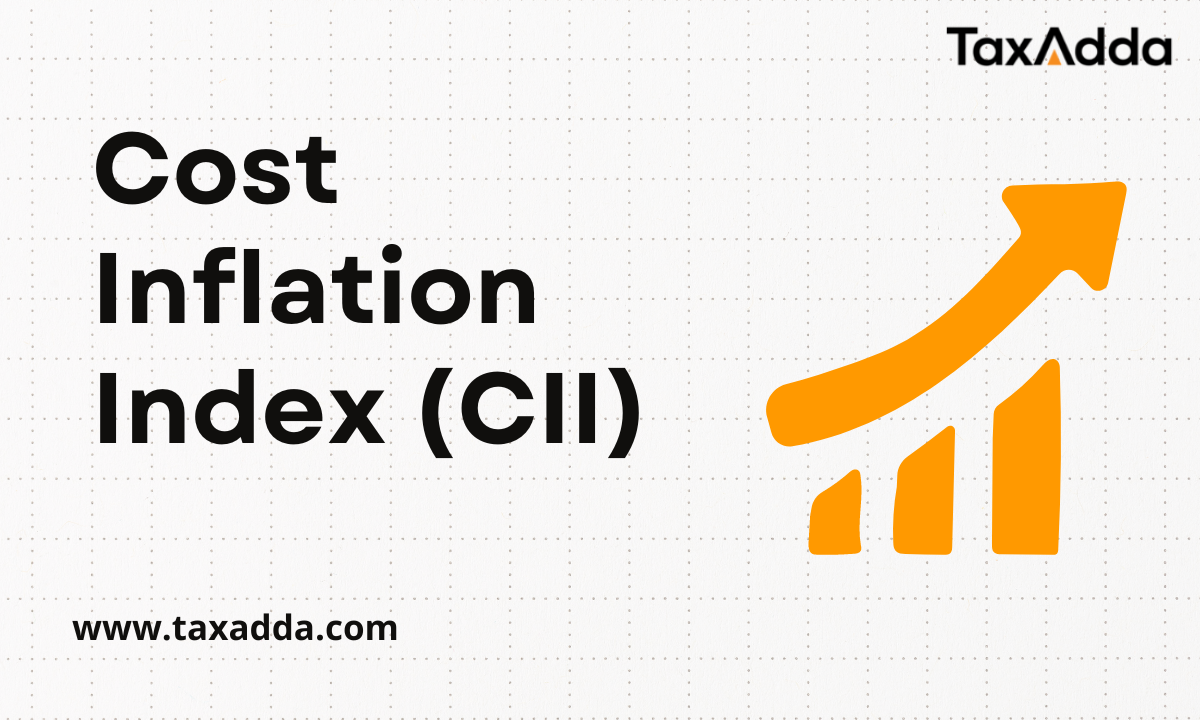Cost Inflation Index (CII) Applicable from Financial Year 2017-18
| Financial Year (01 Apr to 31 Mar) | Cost Inflation Index (CII) |
| 2025-26 | 376 |
| 2024-25 | 363 |
| 2023-24 | 348 |
| 2022-23 | 331 |
| 2021-22 | 317 |
| 2020-21 | 301 |
| 2019-20 | 289 |
| 2018-19 | 280 |
| 2017-18 | 272 |
| 2016-17 | 264 |
| 2015-16 | 254 |
| 2014-15 | 240 |
| 2013-14 | 220 |
| 2012-13 | 200 |
| 2011-12 | 184 |
| 2010-11 | 167 |
| 2009-10 | 148 |
| 2008-09 | 137 |
| 2007-08 | 129 |
| 2006-07 | 122 |
| 2005-06 | 117 |
| 2004-05 | 113 |
| 2003-04 | 109 |
| 2002-03 | 105 |
| 2001-02 | 100 |
| Anytime before 1st April 2001 | 100 |
Cost Inflation Index (CII) Applicable for Financial year 2016-17 and preceding years
| Financial Year (01 Apr to 31 Mar) | Cost Inflation Index (CII) |
| 2016-17 | 1125 |
| 2015-16 | 1081 |
| 2014-15 | 1024 |
| 2013-14 | 939 |
| 2012-13 | 852 |
| 2011-12 | 785 |
| 2010-11 | 711 |
| 2009-10 | 632 |
| 2008-09 | 582 |
| 2007-08 | 551 |
| 2006-07 | 519 |
| 2005-06 | 497 |
| 2004-05 | 480 |
| 2003-04 | 463 |
| 2002-03 | 447 |
| 2001-02 | 426 |
| 2000-01 | 406 |
| 1999-00 | 389 |
| 1998-99 | 351 |
| 1997-98 | 331 |
| 1996-97 | 305 |
| 1995-96 | 281 |
| 1994-95 | 259 |
| 1993-94 | 244 |
| 1992-93 | 223 |
| 1991-92 | 199 |
| 1990-91 | 182 |
| 1989-90 | 172 |
| 1988-89 | 161 |
| 1987-88 | 150 |
| 1986-87 | 140 |
| 1985-86 | 133 |
| 1984-85 | 125 |
| 1983-84 | 116 |
| 1982-83 | 109 |
| 1981-82 | 100 |
| Anytime before 1st April 1981 | 100 |
What is Cost Inflation Index (CII)?
Cost inflation index is the index for the inflation rate in the country. Central Board of Direct Taxes (CBDT) issues this index every year. The cost inflation index for FY 24-25 is 363.
What is use of CII?
CII is used while calculating long-term capital gains. CII for the year in which you have purchased the asset and the year in which asset is sold are considered while calculating capital gains. The cost after indexing is deducted from the sale price for calculation of capital gain. So the capital gain tax gets reduced.
However, the benefit of cost indexing is available only in case of long-term capital gain. If the asset is purchased before 1st April 2001 then the cost inflation index for the year 2001-02, i.e., “100” should be taken for that year. If you have made improvement of the asset, then you need to find out the index cost of improvement using the CII of that year.
Cost after Indexing = Cost before indexing * CII for sale year/CII for purchasing year
Capital Gain = Sale price – Cost after indexing
Read more on How to Calculate Long-Term Capital Gain
Note – In Budget 2017, the base year for CII has been shifted from Financial year 1981-82 to 2001-02. New CII is applicable for Assessment year 2018-19 and subsequent years. Therefore for Financial year 2016-17 the old CII will be used.
CII of Assets purchased before Base year 2001-02
Currently, the base year is fixed at 2001 and CII for 2001 starts at 100. The cost of acquisition of an asset acquired before 1 April 2001 shall be allowed to be taken as FMV as on 1st April, 2001 or the actual cost as chosen by the taxpayer. The cost of improvement shall include only those capital expenses which are incurred after 1 April 2001.
FAQ
Is indexation applicable on mutual funds?
The Cost Inflation Indexation benefit is not applicable to Equity Mutual Funds. However, indexation benefit is available only for capital gains realized in Debt mutual funds bought on or before 31 March,2023. Further from FY 2023-24 indexation benefit is not available for Debt Funds purchased on or after 01 April 23.
What is the term “Base Year” in CII?
CII was introduced in 1981 for the first time. So Initially 1981 was Base year. Further in Budget 2017 the government shifted the base year for CII from 1981 to 2001. For calculation purposes, the index value is set to 100 for the base year.
What will be the cost inflation index for property which was bought before 2001?
The cost of acquisition of an asset acquired before 1 April 2001 shall be allowed to be taken as FMV as on 1st April, 2001 or the actual cost as chosen by the taxpayer.
Can I take the indexation benefit on the Cost of Improvement incurred in 1998-99 ?
The cost of improvement shall include only those capital expenses which are incurred after 1 April 2001.
Who issues the CII?
Central board of direct taxes (CBDT ) Issues the CII for every Financial year.
How CII is calculated?
CII is calculated using the inflation rate of last year. For example for Calculating CII of FY 2023-24, Inflation rate of FY 2022-23 is used.
What is cost inflation index for FY 2024-25?
The cost inflation index is 363 for financial year 2024-25.
Which long term assets are not eligible for Indexation?
1) Indexation benefit is not available in case of listed securities and units of equity-oriented mutual funds. LTCG upto Rs.1Lakh is exempt under Section-112A . LTCG above Rs.1 Lakh is taxable at 10%. To know more read Capital gain on sale of Equity shares
2) From 1st April 2023, indexation benefit is not available for Debt Funds. Indexation benefit will not be available in the case of LTCG on gold mutual funds, international equity mutual funds, fund of funds and hybrid mutual funds as well.
3) All short term Capital Assets
I purchased debt mutual funds in Jan 2020 & sold them in Feb2024, Can I take benefit of Indexation while filling ITR of FY 2023-24 as indexation is not available on debt mutual funds w.e.f. 1April,2023 ?
Yes, you can take advantage of indexation because your debt funds were purchased before 1 April,2023. The amendment in the Finance bill, will apply to investments which are made in debts funds on or after 1 April 2023.


